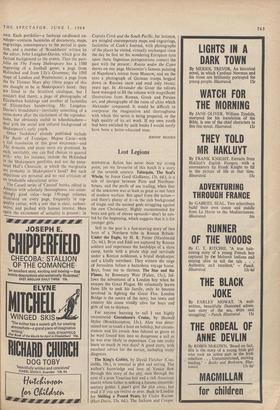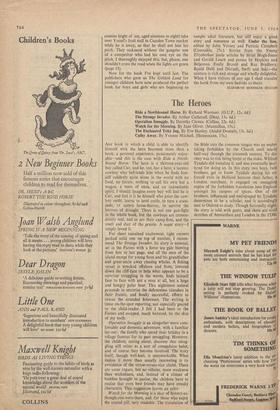Lost Legions
HISTORICAL fiction has never been my strong point, yet my favourite of this batch is a story of the seventh century. Talargain, The Seal's Whelp, by Joyce Gard (Gollancz, 13s. 6d.), is a tale of intrigue between Picts and Northum- brians, and the perils of sea trading, when fear of the unknown was at least as great as our fears of modern warfare. But apart from the action— and there's plenty of it—is the rich background of magic and the ancient gods struggling against the new Christianity. Highly recommended for boys and girls of eleven upwardsdon't be mis- led by the beginning, which suggests that it is for younger girls.
Still in the past 'is a fast-moving story of two boys of a Northern tribe in Roman Britain: Under the Eagle, by H. R. Potter (Macdonald 12s. 6d.), Bryn and Eddi are captured by Roman soldiers and experience the hardships of a slave camp, battle with a pirate ship and servitude under a Roman nobleman, a brutal' shopkeeper and a kindly merchant. They witness the siege of Jerusalem before a hazardous voyage 'home. Boys, from ten to thirteen. The Star and the Flame, by Rosemary Weir (Faber, 15s.), fol- lows the adventures of a London boy when he escapes the Great Plague. He reluctantly leaves farm life to seek his family, only to become involved in fighting the Great Fire. London Bridge is the centre of the story, but town and country life come vividly alive for boys and girls of ten to thiiteen.
For anyone learning to sail I can highly recommend Greenhorn's Cruise, by Showell Styles (Brockhampton, 15s.). Alan was deter- mined not to touch a boat on holiday, but circum- stances and his cousin Ann (almost as green at he was) forced him into as dangerous a sail as he was ever likely to experience. Can one really learn so much in two days? A good story, with excellent advice for the novice, including many diagrams.
The King's Goblet, by David Fletcher (Con- stable, 18s.), is unusual in plot and setting. The author's knowledge and love of Venice flow through this • story of the city, seen through the eyes of a poor Venetian boy and a rich American tourist whose father is seeking a famous sixteenth- century 'goblet. I shan't give the plot away, but read it if you are twelve or over. Back to London for Shilling a Pound Pears, by Claire Rayner (Hart-Davis, 13s. 6d.). The Jackson and Cooper cousins (eight of 'em, aged nineteen to eight) take over Yossel's fruit stall in Camden Town market while he is away, so that he shall not lose his pitch. They reckoned without the gangster son of a competitor who had his own eye on the pitch. I thoroughly enjoyed this, but, please, one shouldn't cross the road when the lights are green (page 15).
Now for the book I've kept until last. The publishers who gave us The Golden Land for younger children have now produced the perfect book for boys and girls who are beginning to sample adult literature, but still enjoy a good story and nonsense as well: Under the Sun, edited by John Verney and Patricia Campbell (Constable, 25s.). Stories from the Young Elizabethan jostle articles by Siriol Hugh-Jones and Gerald Leach and poems by Hopkins and Betjeman. Emily Brontë and Ray Bradbury, Roald Dahl and Disraeli, Swift and Saki—the mixture is rich and strange and wholly delightful. When I have visitors of any age I shall transfer the book from my own bedside to theirs.
ELIZABETH HENNIKER HEATON







































 Previous page
Previous page